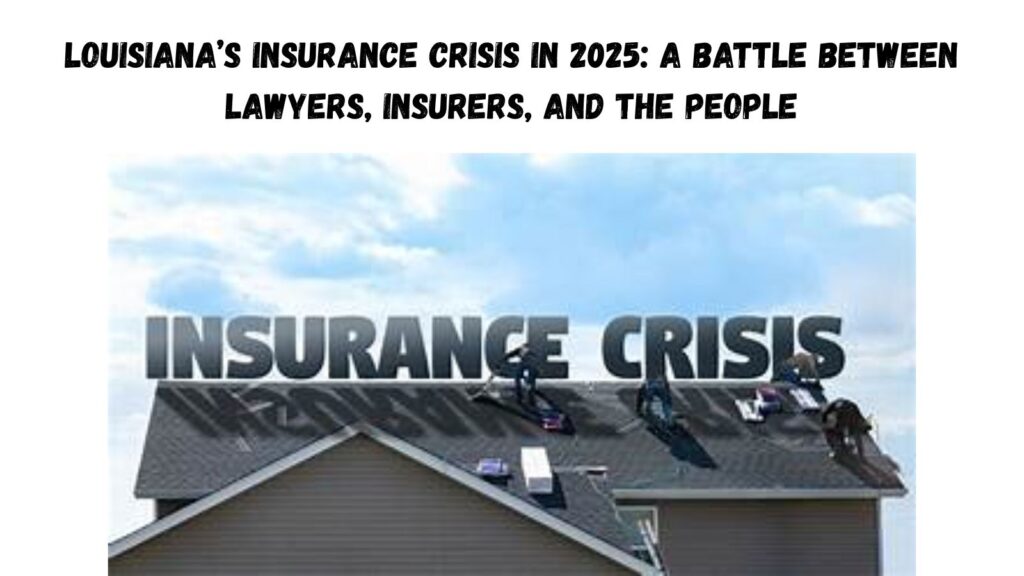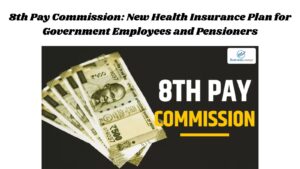A Governor’s Reckoning with the Insurance System
Contents
- 1 A Governor’s Reckoning with the Insurance System
- 2 The Heart of the Crisis: Why Are Louisiana’s Premiums So High?
- 3 Governor Landry’s “Two Little Boys Crying Wolf” Moment
- 4 Legislative Reforms: A Balanced Yet Controversial Approach
- 5 The Role of Trial Lawyers: Justice or Jackpot?
- 6 Real-Life Stories: When Insurance Becomes Unaffordable
- 7 Expert Views: The Path Forward
- 8 Fun Fact: Louisiana and the “No Pay, No Play” Law
- 9 Conclusion: Is This Louisiana’s Turning Point?
- 10 FAQs

In a split political scene, Louisiana Governor Jeff Landry took a bold approach in his 2025 State of the State address. He aimed for bipartisanship, or perhaps nonpartisanship. Instead of blaming one group, Landry criticized both trial lawyers and insurance companies. He compared them to “two little boys crying wolf.”” His comments stirred things up. They signaled a big change in Louisiana’s usual conservative stance on tort reform, insurance regulation, and legal policy.
For decades, Louisiana has battled an unstable insurance market. Residents are feeling the effects of high car insurance rates and expensive homeowners’ policies after hurricanes. They are paying the price for years of political gridlock, natural disasters, and special interests. Louisiana often ranks as one of the top three states for costly car insurance. Homeowners face high rates too. This is due to risks like floods, hurricanes, and frequent lawsuits.
What’s changed in 2025? Landry, a former attorney general and a strong Republican, has ties to conservative business and legal groups. Now, he is no longer picking sides. He blames both the trial lawyer lobby and big insurance companies. This challenges a system that many see as broken, but few have confronted directly.
This article takes a deep dive into the ongoing insurance crisis in Louisiana. We’ll look at what led the state’s insurance market to this crisis. We’ll also discuss the new reforms, how they affect residents, and if Landry’s unique approach can give Louisiana’s people the relief they need.
The Heart of the Crisis: Why Are Louisiana’s Premiums So High?
Louisiana is known for having some of the highest costs for auto and homeowners insurance. In 2024, the average annual premium for full-coverage auto insurance reached about $3,964. This is much higher than the national average of roughly $2,150. In cities like New Orleans, that number balloons even further, with premiums commonly exceeding $5,000 per year.
The Core Issues:
- Litigation Costs: Louisiana is known for its “litigation-heavy” culture. Trial lawyers often advertise for personal injury claims. Insurance companies say this raises settlement demands and, in turn, increases premiums.
- Frequent Natural Disasters: Louisiana faces many natural disasters, like hurricanes and floods. Its geography increases the chances of major losses. This makes it less appealing to national insurers.
- Uninsured and Underinsured Drivers: Louisiana has one of the highest rates of uninsured drivers in the country. These drivers increase risk on the road and raise the cost burden on those who are insured.
- Fraud and Claims Manipulation: Everyone knows the system struggles with fraud, especially in car accidents. There’s also “bad faith” litigation against insurers. This drives up legal and settlement costs.
- Limited Competition: After major hurricane seasons, many insurers left the state or cut back their coverage. With fewer companies to choose from, prices naturally rise due to reduced market competition.
Governor Landry’s “Two Little Boys Crying Wolf” Moment
During his 2025 address, Governor Landry didn’t mince words:
“The only thing worse than a little boy crying wolf is two little boys crying wolf.”
His analogy compares trial lawyers and insurance companies to naughty kids who exaggerate problems. This shows his deeper frustration. He believes both sides act like victims while making the crisis worse. Landry criticized insurance companies, breaking from typical Republican views. He said they care more about profit and marketing than offering affordable coverage.
But he didn’t spare trial lawyers either. Billboards featuring personal injury attorneys are a common sight on Louisiana’s highways. Landry joked that he was “just as tired of seeing Morris Bart as [he] was of seeing the Geico lizard.”
This is very different from earlier administrations. They mainly went after trial lawyers but let insurers off the hook. Landry’s approach has brought together unlikely allies. Some Democrats support his push to ban credit scores in rate-setting. Some Republicans are careful about completely supporting his criticism of the insurance industry.
Legislative Reforms: A Balanced Yet Controversial Approach
In early 2024, the state legislature passed several bills to reform property insurance. Governor Landry signed them into law. These bills focused more on homeowners insurance than auto insurance. They set the stage for the current session’s wider reform package.
Key Legislation:
- Senate Bill 323 – Sets timelines for insurance companies to respond to claims, minimizing delays that often push people to sue.
- Senate Bill 295 speeds up the approval for new insurance products. This helps boost competition in the market.
- House Bill 611 – Lets insurance companies non-renew a small portion (up to 5%) of policies annually, helping them manage risk.
- House Bill 120 – Makes the Louisiana Fortify Homes Program permanent. It offers grants for upgrades that make homes storm-resistant.
The Controversy: HB 423 Veto
Governor Landry vetoed HB 423, a tort reform bill. This bill aimed to cap damages for auto accident victims. It faced strong lobbying efforts. While insurers supported it, trial lawyers — who, notably, were among Landry’s campaign donors — fought hard against it. Landry’s veto surprised many conservatives. However, it showed his aim for “balance,” not just favoritism.
The Role of Trial Lawyers: Justice or Jackpot?
Trial lawyers in Louisiana say they stand for the “little guy.” This includes injured drivers, wronged policyholders, and families fighting against greedy corporations. Critics argue that many lawyers drive up medical costs. They also push for unnecessary lawsuits and profit from a cycle of litigation. This cycle overloads the system.
In Landry’s own words:
“It’s not justice when a billboard lawyer makes millions and a policyholder still can’t afford coverage.”
Trial lawyers argue this is a mischaracterization. Without strong legal protections and the right to sue, insurance companies may deny valid claims. They might also pay victims less than they deserve. The truth, as is often the case, likely lies somewhere in the middle.
Real-Life Stories: When Insurance Becomes Unaffordable
Behind the legislation are real people. Families and businesses are bearing the brunt of this crisis.
Sarah’s Story – Baton Rouge
A single mother of two, Sarah was shocked when her premium jumped from $2,100 to over $4,800 annually — despite a clean driving record. After a minor fender bender where she wasn’t at fault, her insurer still hiked her rates due to “zip code risk” and statewide cost increases.
John’s Dilemma – Lafayette
John, who ran a small auto repair shop, lost his business when his commercial property policy doubled post-Hurricane Ida. Unable to afford it, he went uninsured. When a storm hit, the damages were so extensive that he had to shut down permanently.
Expert Views: The Path Forward
Experts agree that Louisiana needs a multi-pronged solution. Here’s what insurance analysts and legal scholars suggest:
1. Better Risk Mitigation
Investing in storm-resistant infrastructure and improved drainage can lower losses. Also, strict building codes can make the market more appealing to insurers.
2. Litigation Transparency
Track litigation statistics publicly to distinguish between legitimate claims and legal abuse. Some suggest creating a litigation database, like Texas.
3. Insurance Incentives
Provide tax credits or rebates to insurers who return or grow in high-risk areas. Also, promote nonprofit mutual insurers as options.
4. Education and Accessibility
Help residents understand their policies, shop smartly, and avoid unnecessary coverage overlaps. Transparency is key.
Fun Fact: Louisiana and the “No Pay, No Play” Law
Introduced in 1999, the “No Pay, No Play” law restricts uninsured drivers from suing for the first $15,000 in damages in an accident — even if they weren’t at fault. Governor Landry’s proposed increase to $100,000 is among the most significant changes in over two decades and is already being hotly debated.
Conclusion: Is This Louisiana’s Turning Point?
The insurance debate in Louisiana is more than just a policy issue — it’s a referendum on trust, responsibility, and governance. Governor Jeff Landry wants trial lawyers and insurers to share responsibility. This shows that political scapegoating must end now.
Landry has decided to face both major players in the insurance world. This choice brings a new type of reform. It focuses on practicality, not just ideology. His stance may not please everyone, but it does shine a spotlight on a system that desperately needs fixing.
Louisiana’s insurance market will depend on the legislature’s ability to come together for fair and clear reforms. Premiums are rising, and residents are feeling the pressure. The cost of doing nothing is too high. For many Louisiana families, the stakes couldn’t be greater.
10 Must-Know Insurance Trends for 2025
FAQs
1. Why did Governor Landry criticize both insurance companies and trial lawyers?
He thinks both have played a big role in Louisiana’s insurance crisis. Insurers charge high premiums and provide poor service. Trial lawyers add to the problem by filing too many lawsuits, which raises costs.
2. What legislative reforms has Landry supported?
Landry backs bills that:
Improve claims processing times
Reduce fraud
Expand the Fortify Homes Program
Limit abuse, but keep consumer protections
3. How are residents being impacted?
Many are being priced out of coverage altogether. Small businesses are shutting down, and families are struggling with double or triple the premiums from just a few years ago.
4. What’s the controversy around trial lawyers?
They face accusations of overwhelming the courts with dubious lawsuits and raising claim costs. However, they say they offer vital access to justice.
5. What is the outlook for 2025 and beyond?
Optimistic but uncertain. If Governor Landry’s bipartisan tone leads to meaningful reform, residents could see relief. But entrenched interests on both sides still hold significant sway.


